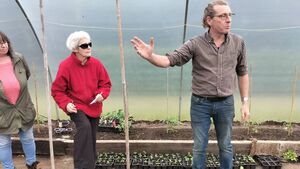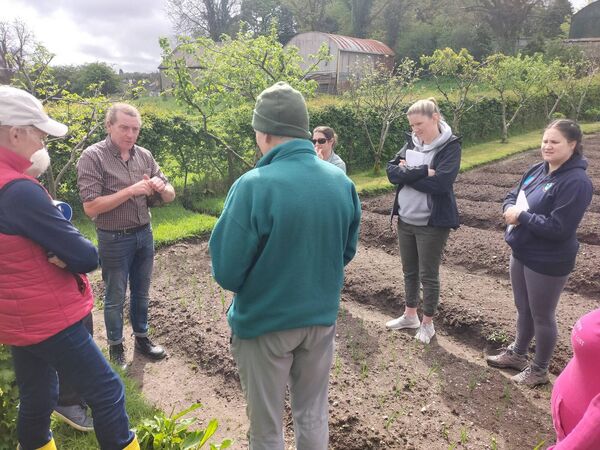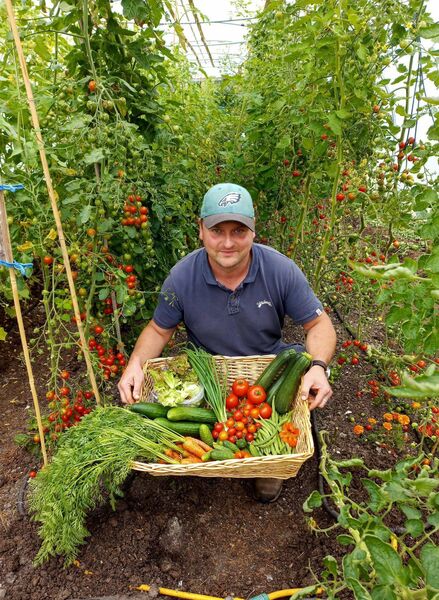Reviving the kitchen garden

Martin Connor teaching at the Community Garden in Ballyhaunis.
The emergence of large retail chains with their giant sourcing and logistics operations could be credited with the demise of the small garden outside every smallholding in County Mayo up to the 1990s.
The nature of how we source our food has also been evolved with the socio-economic evolution of the local populace to dual-income households with an urban affectation for convenience. It’s what Castlebar-based gardener and horticulture educator Martin Connor describes as the “petrol station lifestyle”, a reference to the early-opening food courts attached to fuel stations where breakfasts, dinners, coffees and donuts are sold more profitably than auto fuel.
“We have lost the ability to eat with the seasons,” explains Martin
He’s referring to the broccoli, peppers and carrots grown in the south of Spain and trucked in overnight in the depths of the Irish winter to be sold as loss leaders in hangar-like supermarkets which have made independent vegetable shops commercially unviable.
In this very American retail eco-system transplanted to rural Ireland, kilogramme bags of carrots sold for €2 have eliminated much of the knowledge of garden soil and cultivation that had been handed down through generations in rural Ireland. The convenience of modern sedentary life means “there’s some people in their 20s and 30s who don’t even know where vegetables come from,” says Martin.
And yet there are signs of a recent revival of interest in the kitchen garden. This may be driven less by the economic necessity of earlier generations and more by a quest for self-fulfillment or emotional respite in nature. Local schools, meanwhile, have been prompted by a new emphasis on nature in curricula and various extra-curricula nature schemes to hire Connor and establish school gardens.
Martin, the Castlebar carpenter turned horticulturalist, is enthusiastic to satisfy this new quest for old gardening knowledge, setting out in a white van to schools and gardening clubs across the west of Ireland where he trades as ABC Gardening.
When I caught up with Martin at the Ballyhaunis Community Garden, an allotment located on the ground once farmed by the friars of the adjacent friary church, he was instructing a group of hobby gardeners how to collect and propagate seeds in the damp autumnal cold of an October Saturday.
Martin has brought several kilos of hawthorns, the brilliant red berries adorning whitethorn trees in autumn. With his guidance, his students mash up the red berries in buckets to collect the hard seed inside for planting in sandy soil for propagation.
“Or you could do what the farmers used to do… they’d dig a trench and put hundreds of hawthorn berries into it and cover them with a bit of straw or rushes and then they’d be sure that maybe a quarter of them at least would germinate and you’d have a hedge.”
It’s the kind of guidance that’s as practical as it is revealing of a local knowledge of nature’s rhythms that’s dissipated in the modern age. His knowledge of seed gathering is grasped attentively by the dozen learners present.
“Why would you spend four or five euros on a pack of sunflower seeds,” he asks. “Sure there’s 500 seeds on one flower. You pick them and you dry them. Put them in an envelope and date the seeds.”
His students at the Community Garden are busily writing notes. Hens, if you have them, will take care of the slugs, Martin tells them.
“Frogs eat slugs too so the more of them you have the better!”

Martin's impact on the Ballyhaunis garden is visible in the year since his first workshops here. The soil in outdoor beds at Ballyhaunis Community Garden has been reinvigorated with two tonnes of farmyard manure, he pointed out.
“It wasn’t being fed,” he explains, jabbing a spade into one of the unplanted ridges.
Crops grown in the ridges weren’t always being rotated.
“You can’t sow potatoes in the same ground every year, you have to rotate the different families of vegetables so one year you grow potatoes and next year brassicas or beans. The bean family is nitrogen fixers so they fertilise the soil.”
The learner-gardeners (more than half of whom are women in their 30s and 40s) explain their problems to Connor. These range from the basic – not enough sun – to the complexities of soil structure. Blight hit my potatoes, this year, says another, a 65-year-old man who’s travelled up from Urlaur to recoup the knowledge he’d lost from his father’s telling. You need to spray regularly for blight in the growing season, Martin explains. Or better, get blight-resistant seed potatoes.
Among the first-time gardeners busily taking notes as Martin speaks is Shayla Rasmussen, in her 30s, whose reasons for attending the workshops resonate with some of his points about the potential for communal cohesion as well as learning in gardening.
She joined the garden in early 2023 “as a way to engage more with nature and meet people from the local community".
“I was a little bit nervous to join as I have little experience with gardening, and I was relieved to find the group filled with both experienced and inexperienced gardeners. Everyone in the group has been so helpful, and throughout the year, I have learned so much about different plants and how they grow.
“Together we have spent many Saturday mornings working on our individual plots, as well as doing communal work around the garden. These mornings are my favorite and make it easier to get out of bed on a gloomy Irish day.
"This group has reinvigorated my love of nature and is helping me cultivate a passion for plants and gardening. I am so thankful to have this group and the people in it.”
Rasmussen has also learned from Mo Dalton, a retired teacher and avid flower gardener who’s elated that she grew her first crop of potatoes at the Ballyhaunis Community Garden this summer. She’s also applied the same principle of seed collection from her flower beds to the vegetable garden, collecting seeds from tomatoes for use next year.
“You dry the seeds out, then keep them in a dry place, label them and keep them over the winter to plant out for the next growing season,” she explains to other members of the group who’d clearly never thought about the simple availability of next year’s crop in this year’s mature vegetables.
This is the kind of information that Martin is seeking to impart to his students.
“There’s a big cohort of people who want the education. They’re crying out for information,” he says.
There are traces in Martin’s enthusiasm for the zeal of healthy eating campaigners like Jamie Oliver. He’s motivated as much by the health outcomes of vegetable knowledge as he is by the opportunity to reconnect youths to nature. Martin spends three days of his every week visiting primary schools. He’s also taught adults at the Tubbercurry Family Resource Centre and teenagers at a youth project in Ballina and Castlebar.
“I’m talking to 2,000 kids a year,” he explains.
Like the British celebrity chef, Martin has observed how lower-income groups are particularly vulnerable to poor eating and suboptimal health outcomes.
“Cheap and nasty” food frequently sold by large retail chains exacerbates a lack of knowledge among consumers about the origin and nature of their food, he believes.
“I have a particular memory of one particular kid who ate only pasta, his diet was poor… it was all down to his education.”
Convenience food culture is leading to depression and obesity, said Martin. Poor diet isn’t an urban phenomenon. Knowledge of vegetable growing has been lost too in the farming community, he says.
“Absolutely, farming is all gone to cattle and sheep, and tillage is all gone. I often hear kids saying grandad and granny have a garden but rarely hear that mom or dad have a vegetable garden.”
Martin limits his visits to retailers. Rather he and a group of friends share and barter their home produce.
“We swap and share, some of us have pigs, and we swap for a lamb with someone else.”
Aside from health outcomes associated with modern food production and retail systems, there’s the bigger question of how sustainable it is in an era of climate change. Already severe drought in the south of Spain, where production has relied on water being channeled from the north of the country, has reduced output and forced Irish retailers to pay more for their supply.
That could mean an upward rise in the average retail prices for vegetables which has fallen between 2003 and 2023, according to market research by Teagasc. It estimates that the horticulture land area will shrink by 7% in 2023 as farmers exit the sector.
And yet Ireland’s position as a net importer of vegetables doesn’t look set to shift course anytime soon. Horticulture certainly isn’t a priority for farming groups. The loudest volume in Ireland’s farming lobby has long been reserved for the dairy farmers, the sector's highest earners, while the political clout of the country’s meat processors has ensured beef production remains a policy (and subsidy) priority for the Government.
There are signs, however, that even with the iron grip of the cluster of retail chains on the market there is some space for local growers.

Not far from Ballyhaunis market gardener Sebastian Omylanowski grows leaf lettuce, scallions, tomatoes and radishes under the ‘Mannin Farm’ brand. Vegetables grown in his polytunnels sell well at the local Supervalu store even though they’re priced higher than counterparts sourced directly by the retailer from overseas.
Customers are willing to pay more for quality, said Omylanowski, who built four long polytunnels in the back garden of his home in Larganboy, five kilometres from Ballyhaunis.
“We are not trying to compete with the Spanish vegetables,” he explains. “Our vegetables are completely different, they’re a bit more expensive but they’re a premium product… Our produce will keep for two weeks in the refrigerator but the cheaper produce will wilt away after a few days in the fridge. People see this, they can see that our’s is a superior quality product.”
Most Saturdays Omylanowski has a stall outside the community centre in Brickens, alongside the Village Farm coffee shop which also sets up there. He’s also selling at Duffy’s Butcher's shop in Kilkelly and he has customers calling to his home, located near the lake from which his business takes its name.
Mannin Farm is aiming to grow 25 different vegetable types in the coming year with ten varieties available for market at any one time. Omylanowski is also hoping next year to launch a vegetable box programme whereby he’ll supply clients with a €20 box of seasonal vegetables.
“We stick to the season, so we’ll supply you with whatever is in season at that time.”
In the off-season, Omylanowski makes garden furniture and does maintenance as well as landscaping work.
“In November, I’ll tidy out the tunnels, then top up the compost and in late January I’ll start again, I’ll plant some peppers, in February then I’ll plant some lettuce and scallions.”
While his is a relatively new business, Omylanowski appears to be living proof that there’s a living of sorts in local vegetable production. Martin Connor, meanwhile, has plenty to do in winter, the time of year when nature sleeps and thus trees can be transplanted and cuttings taken for further propagation. He estimates having sowed 20,000 trees in the decade he’s been an educator.
At schools, we plant hedges and instill a love of nature. At a primary school in Castlebar, we put in an orchard and fruit garden, one of the 25 national schools Martin is currently visiting.
The disruption caused by climate change to Irish supermarket suppliers in Spain this year may, if repeated in coming years, ultimately lead to educators like Martin being more in demand. Ireland, after all, may be forced to secure its food supply by growing more of its vegetables at home as it did only a few decades ago. It would require the retooling of a retail model that uses undervalued, imported food as a loss leader, a draw for more profitable products. In the meantime, there appears to be at least a stirring of interest in growing at home again.






